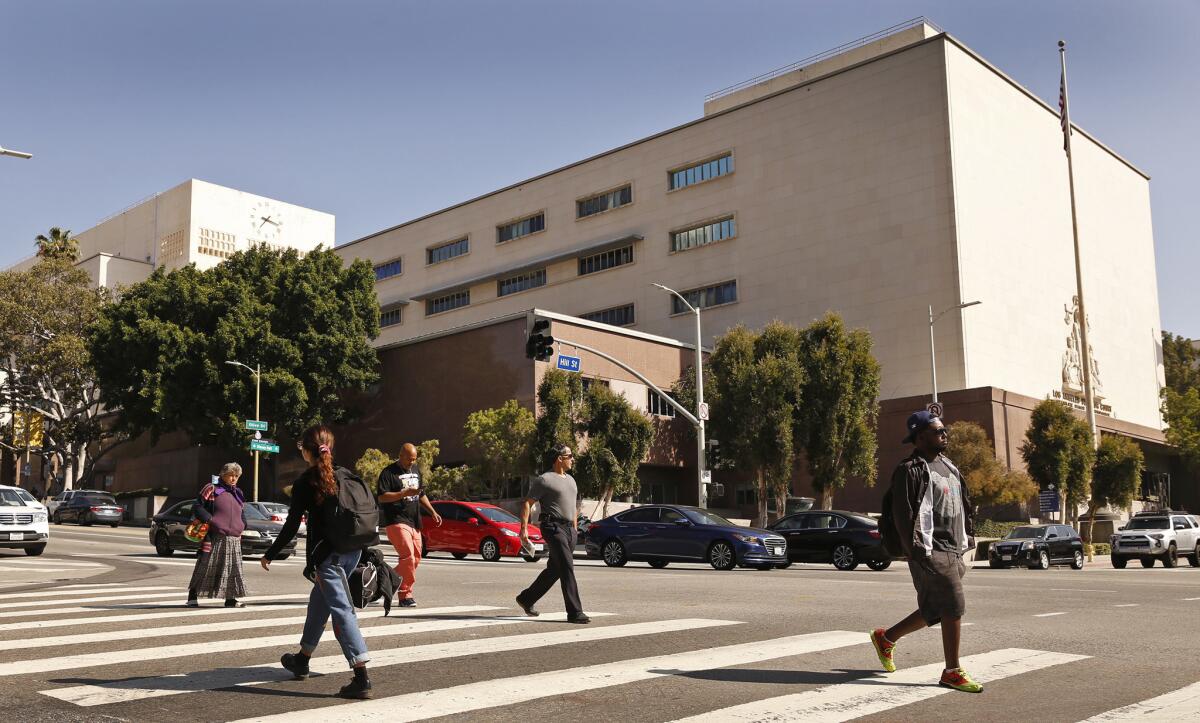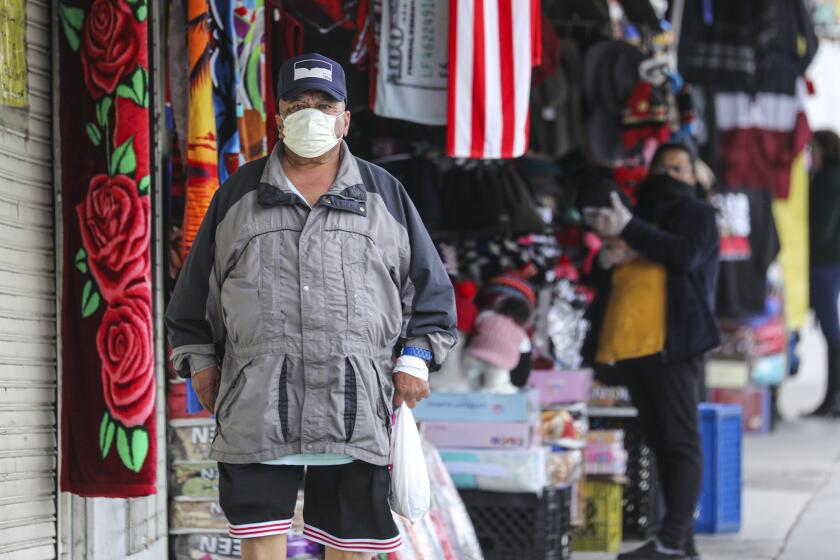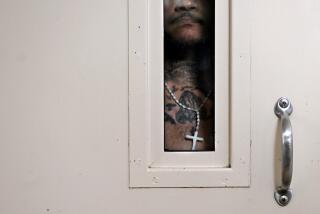Justice in a time of coronavirus: Scared jurors, delayed trials, court closures

- Share via
On the 15th floor of the criminal courthouse in downtown Los Angeles, it was the final day of an attempted murder trial Friday when a request came from the jury: Could they all sit apart?
The request was granted. As the panel heard evidence against a homeless woman accused of lighting another transient on fire, 12 jurors and two alternates sat with a vacant seat separating each of them. Call it an ad hoc social distancing for the legal system.
In the time of coronavirus, welcome to California’s legal system, where the nation’s busiest trial court in Los Angeles and a network of county courts up and down the state grapple with a widening pandemic, volatile anxiety and a tangle of bureaucracy to keep the wheels of justice moving.
“You can’t just shut down the public safety function in a crisis,” said Michele Hanisee, president of the union representing Los Angeles County deputy district attorneys. She acknowledged the balancing act but said, “We cannot deprive those accused of a crime their due process rights. The courts have to keep working.”
In the face of the growing outbreak, courts have taken a patchwork of measures: months-long delays in trials, excusing jurors over the age of 60, and temporarily closing courthouses altogether.
Get the latest coronavirus updates from our staff in California and around the world.
Here’s a snapshot: Santa Clara County, where the coronavirus outbreak has hit particularly hard, announced delays Friday in many traffic, family, civil and probate trials, as well as some criminal trials. In San Diego County, all new civil trials were suspended for the next month. Orange County will not start new civil trials until May 1. In Ventura County, courts will be closed early next week, then reopen on a limited basis for matters such as urgent criminal cases and temporary restraining orders. Contra Costa Superior Court was closed for two weeks.
Late Friday, the top federal judge in Los Angeles, Chief U.S. District Judge Virginia A. Phillips, issued an order stating that no jurors would be called for criminal or civil trials until April 13. Meanwhile, magistrate judges will arraign defendants and sign search warrants, and other hearings will be proceeding as planned.
Yet no court anywhere matches the sheer size and scope of the L.A. County Superior Court, with more than three dozen courthouses, thousands of pending cases and a regular spate of high-profile trials. Until Friday morning, administrators said there were no disruptions to court operations.
That changed by the end of the day, when Presiding Judge Kevin Brazile recommended that new civil trials and some criminal trials be pushed back 30 days — a staggering step in a system infamous for long waits for hearings and trials.
A spokeswoman for Brazile declined multiple interview requests, but his announcement likened the courts to hospitals and emergency medical facilities, where there’s no choice but to remain open. Ann Donlan, the court spokeswoman, said administrators were focused on slowing down operations responsibly.
“There’s a balance between meeting due process rights and public health and safety,” Donlan said. “We’re working on it as fast as we can.”
Lou Shapiro, a criminal defense attorney in Century City, said he was among several attorneys who approached Brazile this week, asking for a swifter and more expansive response. He thought Brazile should have gone further, ordering delays to trials outright in civil cases and in criminal cases in which a defendant is out of custody, and also mandating certain hearings occur remotely, rather than merely offering recommendations.
“They are taking a reactive approach. ‘Let’s see how this evolves.’ What are they waiting for? We have the opportunity to get ahead of it and we’re not. It’s outrageous,” Shapiro said. “Disneyland is closed and the courts are open.”
Several attorneys said they were frustrated by the lackadaisical practices in courthouses this week: Scant hand sanitizer was available to the general public. Security screenings at courthouse entrances had no wipes to clean surfaces as more people came through. And elevators were crammed as ever — filled with people coming for jury duty.
Mike Arias, a prominent civil attorney in L.A., said he was most concerned about jurors.
“The judge, the staff, the lawyers, the clients — we all choose to be there. Jurors don’t,” Arias said. “You can imagine if people get that request for a jury summons and walk into a room of 300 or 400 people, they’ll say, ‘What the heck? This isn’t for me.’”
Genie Harrison, an employment attorney in L.A., said part of the benefit in delaying trials was to afford more space in courthouses for jurors.
“They have to have enough room to meet the social distancing requirements,” Harrison said.
Court staff and attorneys cited the fear that in such a heavily trafficked place, the coronavirus could spread rapidly and even reach defendants in custody, where it could ravage jail populations.
For the next 30 days, Angel Navarro, a Pasadena defense attorney, cannot meet with clients detained at the Metropolitan Detention Center, the federal lockup in downtown L.A. Navarro learned of the interdict on legal visits Friday, with no forewarning, he said.
He was reminded of the Sept. 11 attacks in 2001, when jails and prisons were locked down for a few days. “But this, this is 9/11 every day,” he said. “This is new territory for all of us.”
A spokesman for the Bureau of Prisons said that no inmates had tested positive for COVID-19, and that some attorney visits would be granted on a case-by-case basis.
Melissa Weinberger, who represents clients in state and federal court, said she was also concerned about defendants being brought to court from different jails and lockups. But was it fair, she asked, to put off those proceedings and delay their day in court?
“There’s this balance between people’s constitutional rights, to get into court and before a judge, versus this danger that they’re facing,” she said.
Part of the reason for the sluggish response to the pandemic appeared to be confusion on the part of who, exactly, had the authority to shut down or alter court operations.
Many presiding judges in counties have latitude in determining how their courts are run, but California Chief Justice Tani G. Cantil-Sakauye can issue emergency orders to extend deadlines — a powerful tactic that can also end up keeping adults and juveniles in custody longer.
If granted, “the young and the poor will suffer disproportionately because they will not be able to have appropriate oversight and advocacy on their cases in a timely fashion,” said Mary P. Carey, a criminal defense lawyer in Walnut Creek.
Still, she said, extraordinary measures are needed for extraordinary times. “The problem is this: The users of the court system and the employees are at risk from business as usual.”
Contra Costa County Public Defender Robin Lipetzky said the office’s greatest concern is for clients who are in jail because they could not afford bail.
“Now they are going to sit there in custody while their cases can’t progress,” Lipetzky said.
As the court operations slow down, many feared the economic fallout — from couriers and court reporters to snack bars.
In the fifth-floor snack stand in downtown L.A.’s criminal courts building, a clerk who provided only her first name, Angela, said business had already dropped. She labored to keep surfaces clean, wiping down the formica counters and bleaching the floor every night.
She saw no hand sanitizer in the building, so she added some for customers next to the Tapatio hot sauce and other condiments.
And she works with a lingering fear: “If they shut down the building, how can I pay my rent?”
Times staff writer Maura Dolan contributed to this report.
More to Read
Sign up for Essential California
The most important California stories and recommendations in your inbox every morning.
You may occasionally receive promotional content from the Los Angeles Times.












